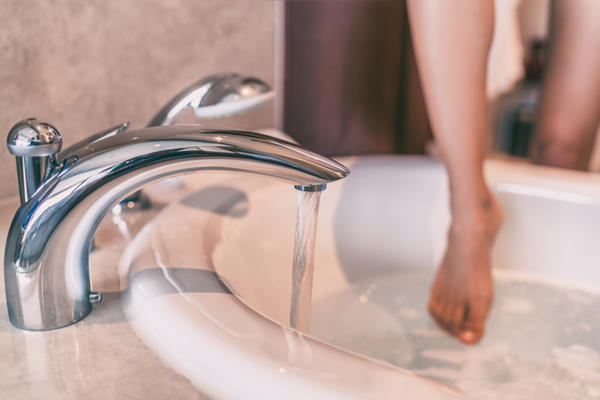Do you have trouble sleeping at night? If so, you’re not alone. Around one in four women experience symptoms of insomnia according to the Office on Women’s Health, an attached agency of the US Department of Health and Human Services. This is partly due to hormonal fluctuations that happen during a woman’s menstrual cycle. Other conditions that cause hormonal changes, such as pregnancy or going through menopause, can also make it more difficult for women to get a good night’s sleep.
Lack of sleep can make women feel tired and sleepy during the day. It can affect concentration and make it harder for them to do work or school activities. To avoid these problems, women are advised to develop good sleep hygiene. But what exactly is sleep hygiene? In a nutshell, it refers to healthy habits that help improve sleep quality. It can be something that is universally accepted as being helpful to promoting proper sleep, or it can be something quite personal—a ritual, routine, or pattern of doing things that one has come to associate with rest and peaceful nights of slumber.
In this short guide, we’ll provide some no-nonsense tips that can help women practice good sleep hygiene. Let’s start with what one wears to sleep:
Wear Comfortable Sleepwear to Bed
Helping your body relax in bed is part of getting a good night’s sleep. Besides using soft breathable sheets and fluffy pillows, a great way to feel calm and cozy in order to fall asleep is to wear proper sleepwear. Shop for women’s pajama tops and bottoms with soft and breathable fabric. Proper sleeping clothes should make you feel comfortable and ready for bed. If you’re using old and scratchy shirts that have seen better days, it’s time to put them away. Make sure to invest in clothes specifically designed for sleep to help you doze off.
See Also: Sleeping Masks to Get Glam Overnight
Maintain a Cool and Comfortable Bedroom Temperature
Generally, our bodies cool down at night to prepare for sleep. It is easier to doze off into dreams when the room temperature is a little on the cooler side. Keeping the room temperature cooler is also a good idea if you’re experiencing hot flashes. Other women even place a fan by their nightstand to feel even more comfortable at night.
On the other hand, it’s also hard to fall asleep when it’s too warm or too cold. As such, it’s important to set your room temperature at a comfortable level that’s just right for you. This will help you avoid waking up in the wee hours just to adjust your heating or cooling temperature. If it’s really cold during the winter, wear layers of clothing or use a thick blanket to keep yourself warm and cozy.
Establish a Relaxing Bedtime Ritual for Good Sleep Hygiene
When people go straight to bed, some don’t fall asleep right away. These individuals might experience tossing and turning for hours before they get any real sleep.
A good way to prime your mind and body for sleep is to develop a relaxing bedtime routine. This allows your brain to identify cues that you’re about to go into sleep mode, allowing you to fall asleep more easily.
You should begin your bedtime ritual at least 30 to 60 minutes before going to bed. This can include any activity that helps you relax, such as listening to music, reading a book, writing notes on your journal, or meditating. Make sure to avoid overly stimulating activities, such as working, having long chats with friends, or binge-watching a show before bedtime. Doing these things might keep you awake longer than you intend.
Take a Warm Bath Before Going to Bed

Taking a warm bath can be part of your nightly routine before going to bed. A warm bath is relaxing and can soothe tension in your muscles. Ironically, a warm bath also lowers your core body temperature, which helps prepare your body for sleep. The more relaxed you feel, the deeper your slumber will be. This is great because deep and uninterrupted sleep will help your body feel more rested and renewed by the time you wake up.
For women experiencing menopause, it’s probably better to take a bath with lukewarm or cool water before going to bed. Warm baths or showers could prompt hot flashes that can make it harder for the person to fall asleep. If you’re one such individual, opting for a cool bath instead should help your body relax, especially if you already felt hot through most of the day.
Stick to a Consistent Sleep Schedule
Try to fall asleep at the same time every night and wake up at the same time in the morning. Maintaining the same sleep schedule helps your body establish its internal rhythm for good sleep hygiene. When your body gets used to this, it would be a lot easier to fall asleep at night. Try to keep to the same sleep schedule even on weekends to avoid disrupting your internal body clock.
When you’re establishing a sleep schedule, you might be tempted to sleep late. Things like watching a new show or hanging out late with friends might be on your plans. However, if you want to have healthier sleeping habits, you should start prioritizing sleep. Try to establish a consistent bedtime that would allow you to get seven to eight hours of sleep each night.
See Also: Is It Safe To Sleep With An Electric Box Fan On All Night?
Limit Your Screen Time and Avoid Using Electronic Gadgets in Bed
Electronic devices such as computers, phones, and televisions emit blue light that can inhibit the synthesis of melatonin in your brain. Melatonin is a hormone that the brain produces in response to darkness. It regulates our sleeping cycle and helps us feel drowsy when it’s time for bed. Without enough melatonin, we usually develop problems falling asleep at night. As such, it will help you a lot if you reduce your screen time throughout the day. Especially important is avoiding the use of your phone when you’re already in bed. It’s also best to sleep with your phone away from your bed to keep notifications from waking you up and interrupting your sleep.
Avoid Caffeine in the Afternoon and the Evening

Caffeine’s effects on the body can last between three to seven hours after you’ve taken food or beverages containing it. So, if you drink coffee in the afternoon or the evening, you might feel alert and awake a lot longer than you intend. To avoid this, it’s best to drink coffee and other caffeinated drinks in the morning. Take note, however, that people have different reactions to caffeine. If you’re not used to drinking coffee, you might be more sensitive to caffeine. Thus, in this case, it would be ideal to drink coffee in the morning. Some people, on the other hand, may drink coffee in the afternoon and still be able to sleep on schedule.
Refrain from Eating Late-Night Meals Before Going to Bed
When you eat late at night, digestive muscles that break down food need to keep working when they should be resting. This disrupts your body’s internal schedule, keeping you from getting deep and restful sleep. Eating a late-night meal can also lead to indigestion and tummy aches. And when you feel discomfort, it will be much harder to fall asleep.
To maintain healthy sleeping habits, try to schedule your last meal at least three hours before you go to bed. Make it a point to sleep early so you’re not awake too late at night to feel hungry again.
Establishing good sleep hygiene will not only help you get enough restful sleep. It keeps you healthier by lowering your risk of depression, heart disease, stroke, and even type two diabetes as you age. You’ll wake up refreshed in the morning with a better mood to face the day. So, make it a habit to practice and cultivate proper sleep habits.
Read Also:
What It Feels Like to Wake up in Love
Improve Your Morning Routine with These 8 Tips
How to Cleanse Your Social Media so That Debbie’s Bikini Pics Won’t Bring You down


